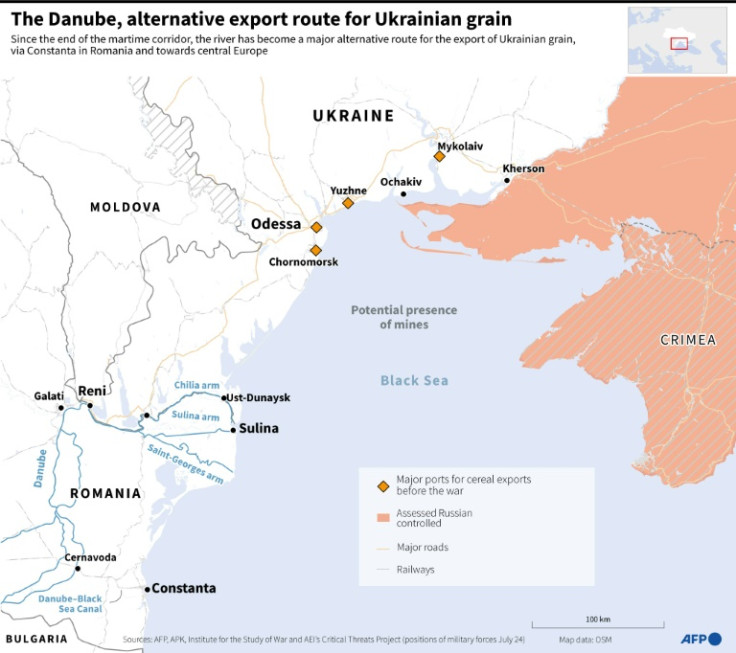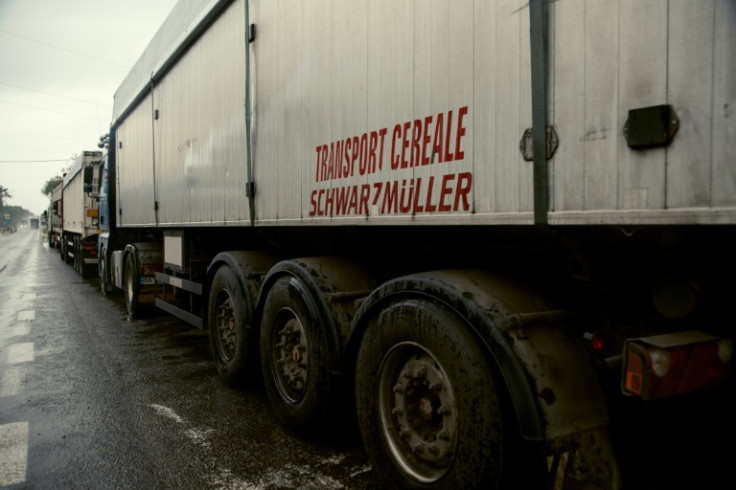Ukrainian grain lorries wait days to unload at Danube port
Anton Moiseyev sat for the third day in the cabin of his lorry, parked by a roadside cafe in Ukraine's southern Odesa region, in a bottleneck triggered by Russia's scrapping of a grain shipping deal.

Anton Moiseyev sat for the third day in the cabin of his lorry, parked by a roadside cafe in Ukraine's southern Odesa region, in a bottleneck triggered by Russia's scrapping of a grain shipping deal.
He was waiting along with hundreds of other lorry drivers taking grain to the Danube river port of Izmail, now the main export route for Ukrainian agricultural products.
"I don't know how much longer it will take," said the 41-year-old driver delivering a cargo of wheat from the central Kirovograd region.

Previously, Ukraine exported via the Black Sea on large ships but a wartime deal on safe passage broke down after Moscow exited July 17.
Russia then bombed Black Sea port infrastructure.
Huge volumes of grain are now heading to small river ports in Odesa region adjacent to Romania.
"That's why everyone comes here. From all over Ukraine, practically," said lorry driver Sergiy Gretsyk, 36, from Vinnytsia region in centre-west Ukraine.
Formerly obscure ports, Reni and Izmail, have become crucial to global food supplies and are struggling to process all the grain, causing the massive bottleneck.
"The ports of Reni and Izmail cannot handle this," since they are "drops in the ocean" compared to the Black Sea ports, Moiseyev said.

"There is a lot of grain but we can't get it out."
In a further obstacle, Russia attacked Reni with drones on July 24.
It was unclear whether Reni port was still operating.
Army spokeswoman Nataliya Gumenyuk told AFP on Wednesday that "the damage is quite significant, but it did not stop the port completely".
All the lorry drivers AFP reporters spoke to were heading to Izmail.
"The guys (at Reni) say that they won't accept us there yet," said Gretsyk.
"Things got worse after Reni was bombed," Moiseyev said, explaining the ports had improved processing time since last year.
"One strike and it all ended, we are sitting and waiting again."
In Izmail itself, at least four cargo ships were docked at or near the port, facing Romania across the broad, greenish river, AFP journalists saw.

Ships on the river were flying flags including Liberia and Slovakia.
Lorries were waiting outside the port but the cranes were not operating.
Lorry drivers blamed the rainy weather, saying Izmail does not have facilities to load grain under cover.
On the road to the port, birds pecked at grains of wheat and maize spilled from lorries.
The small town -- with a pre-war population of about 70,000 -- appeared to be benefitting from the grain boom.
On the main avenue, there were Ukrainian flags flying and the tarmac and pavements looked new and well maintained. There were numerous restaurants and cafes and a yacht club under construction.
Due to its strategic position, Izmail has changed hands many times.
A stone mosque on the riverbank dates back to 16th century Turkish rule.
The road from Odesa to Izmail is a single carriageway, passing fields of maize and sunflowers and vineyards. It crosses into Moldova briefly.
Long lines of lorries were parked on roadsides and in tarmacked areas in fields, waiting for their turn to unload in a queueing system.
Many were unmarked but some had names of haulage companies from Poland, France, Germany and the Czech Republic but Ukrainian plates.
One driver, Igor Skrypnyk, 47, said he had been waiting eight days.
"Our ship hasn't yet got into the port. It's not clear why," Skrypnyk said, suggesting the ships may also be waiting in line.
"Lorry drivers are quitting, they don't want to work," he said.
© Copyright AFP 2025. All rights reserved.





















